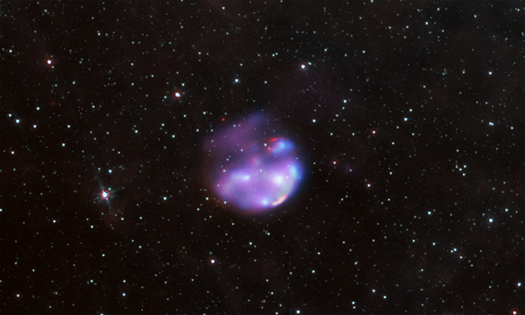NASA's Swift, Chandra Explore a Youthful 'Star Wreck'
While performing an extensive X-ray survey of our galaxy's central regions, NASA's Swift satellite has uncovered the previously unknown remains of a shattered star. Designated G306.3-0.9 after the coordinates of its sky position, the new object ranks among the youngest-known supernova remnants in our Milky Way galaxy.
Astronomers have previously cataloged more than 300 supernova remnants in the Galaxy. The new analysis indicates that G306.3-0.9 is likely less than 2,500 years old, making it one of the 20 youngest remnants identified.
This composite of supernova remnant G306.3-0.9 merges Chandra X-ray observations (blue), infrared data acquired by the Spitzer Space Telescope (red and cyan) and radio observations (purple) from the Australia Telescope Compact Array. The image is 20 arcminutes across, which corresponds to 150 light-years at the remnant's estimated distance.
Astronomers estimate that a supernova explosion occurs once or twice a century in the Milky Way. The expanding blast wave and hot stellar debris slowly dissipate over hundreds of thousands of years, eventually mixing with and becoming indistinguishable from interstellar gas.
Like fresh evidence at a crime scene, young supernova remnants give astronomers the best opportunity for understanding the nature of the original star and the details of its demise.
Supernova remnants emit energy across the electromagnetic spectrum, from radio to gamma rays, and important clues can be found in each energy band. X-ray observations figure prominently in revealing the motion of the expanding debris, its chemical content, and its interaction with the interstellar environment, but supernova remnants fade out in X-ray light after about 10,000 years. Indeed, only half of those known in the Milky Way galaxy have been detected in X-rays at all.
More at http://chandra.harvard.edu/photo/2013/g306/
-Megan Watzke, CXC
Please note this is a moderated blog. No pornography, spam, profanity or discriminatory remarks are allowed. No personal attacks are allowed. Users should stay on topic to keep it relevant for the readers.
Read the privacy statement

